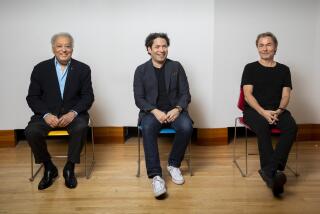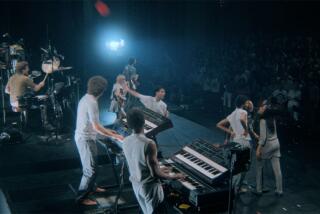Film Music: A Stellar Playboy Prologue
- Share via
Where does Mark Cantor find all these things? Year after year he presents a full evening of jazz on film to enthralled audiences as part of the free events leading up to the Playboy Jazz Festival (which takes place today and Sunday at the Hollywood Bowl).
Thursday night, in the Los Angeles County Museum of Art’s Bing Theater, Cantor did it again. And even though many of the items had been seen before, the imaginativeness of his program, coupled with the inclusion of a few never-before-seen clips, made for yet another extraordinarily entertaining evening.
The program was divided into four individual sets. “Hittin’ on the 88s,” devoted to pianists, included a previously unscreened segment featuring a 1950 performance of “Humoresque” by the legendary Art Tatum. Fascinating, in an entirely different fashion, was a 1943 showboat boogie-woogie performance by the elegant Hazel Scott, as well as clips featuring Oscar Peterson, Marian McPartland, Willie “The Lion” Smith and the Dave Brubeck Quartet.
Set No. 2, “Ballad Potpourri,” was dominated by a newly discovered 1961 clip of the John Coltrane Quartet playing “I Want to Talk About You.” The performance is stunning, with Coltrane’s solo revealing the transitioning from his harmonically layered improvising of the ‘50s into the free expressiveness of his ‘60s playing.
Another segment, featuring the unlikely pairing of Coleman Hawkins and Charlie Parker, included some dazzling improvising, especially from Parker. But as with a number of other clips, the sound was recorded before the video was shot, thereby presenting the musicians with the difficult task of matching their fingering movements to their previous improvisations--not an easy task.
“Politically Incorrect,” segment No. 3, included an intriguing group of three vocal performances, by Sarah Vaughan, Abby Lincoln and June Christy, as well as a spirited 1957 encounter between Dizzy Gillespie and Louis Armstrong. Two aspects of “political incorrectness” were dealt with via Charlie Barnet’s 1944 “Cherokee,” in which white musicians mimed the playing of the Barnet band’s black soloists on the audio track (to pacify the Southern audiences of the period), and a 1941 performance by the remarkable scat singer Leo Watson (in which the African American musicians leave a craps game to perform their number).
The final segment, “Jazz Potpourri,” ranged from Benny Goodman and Savoy Sultans to Mamie Smith before concluding with two superb items: Freddie Hubbard’s exquisite version of “Blue Moon” with the Art Blakey Band, and Charles Mingus’ “So Long Eric,” notable primarily for the too-brief solo passages by the remarkable alto saxophonist Eric Dolphy.
More to Read
The biggest entertainment stories
Get our big stories about Hollywood, film, television, music, arts, culture and more right in your inbox as soon as they publish.
You may occasionally receive promotional content from the Los Angeles Times.










